Showing 221–230 of 257 results
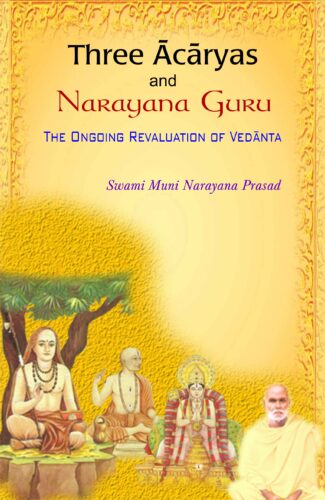
The book speaks about the philosophy of Narayana Guru as guidance to study and compare the philosophies of the acaryas, particularly those of Shankara, Ramanuja and Madhva. It also explores the concepts of avidya and maya, atomicity of the self, consciousness and the self, tat tvam asi, karma and reincarnation and the ultimate liberation.
Shankara, Ramanuja and Madhva are considered the three acaryas of South India who commented on the three basic texts of Vedanta, that is, the Upanishads, the Brahma-Sutras and the Bhagavad-Gita, and therefrom originated the three major schools within the Vedanta fold — Advaita, Vishishtha advaita and Dvaita respectively. This volume is concerned with the philosophy of the famous saint-teacher Narayana Guru and his perspectives on the philosophies of the three acaryas.
The book uses the philosophy of Narayana Guru as the guide to study and compare the philosophies of the acaryas. It begins with the life sketches of the three acaryas and discusses their philosophies, especially the various specific viewpoints they maintained and the points on which they disagreed. It explores the ideas of the acaryas on avidya and maya, atomicity of the self, consciousness and the self, tat tvam asi, karma and reincarnation and the ultimate liberation. It also scrutinises their use of terms like that of atha which literally means now then. It examines the perception of Narayana Guru vis-a-vis the particular philosophical positions in a unified manner. It also contains the full text, transliteration and translation of the original Vedanta-Sutras of Narayana Guru.
The volume will interest students and scholars who are engaged in advanced studies on the philosophy of Vedanta, and persons keen on acquainting themselves with the philosophy of Narayana Guru.
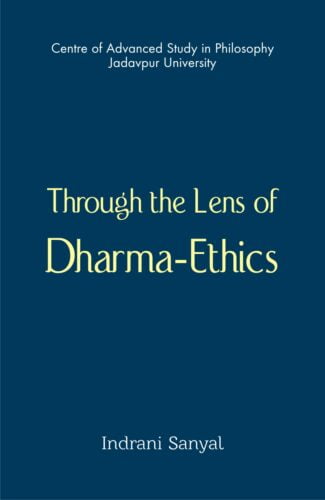
This volume primarily concerns itself with the elaboration and analysis of the Vaidika ethics as one of the exemplars of DharmaEthics, to answer the basic question as to why should one be moral. A sustained analysis has been carried out to explain the sense of transcendence of the empirically existent, in terms of abhyudaya, mukti for which this DharmaEthics is a supportive ladder.
Notwithstanding the profound and vast dimension of the concept of Dharma as such, Through the Lens of Dharma-Ethics, the author has endeavoured to put forward some of the metaphysical affirmations on which the feasibility of Dharma-Ethics as a discipline reposes. This volume primarily concerns itself with the elaboration and analysis of the Vaidika ethics as one of the exemplars of Dharma-Ethics, to answer the basic question as to why should one be moral.
An attempt has been made in this volume to rearrange and reformulate the answer by discussing the concepts of Dharma and its allied concepts, different kinds of karmas prescribed for the individuals, the fourfold scheme of purushartha, psychology of human volition, roles of different psychological traits, nature of motivational force conveyed through the imperative statements and many other relevant issues.
A sustained analysis has been carried out to explain the sense of transcendence of the empirically existent, in terms of abhyudaya, mukti for which this Dharma-Ethics is a supportive ladder. If there is hope for man, why should there not be hope for mankind? possibility of this sort has also been addressed. The human-centric Dharma-Ethics has been deciphered as a description and also as a prescription for the embodied humans with their various sort of indebtedness, about how they live and how they ought to live in the truth of Dharma.
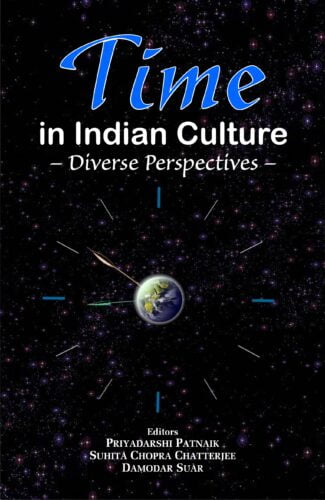
The volume is a comprehensive collection of papers dealing with the philosophical, religious/spiritual, and linguistic aspects of time, and time as understood in Indian art, music and other aspects of culture.
The concept of time has been variously interpreted and debated in the Indian tradition since ancient times. It is referred to by the word kala which has many meanings like time personified, time as death, time as a cycle and so on, and other words like samaya, vela, kshana as well, which refer to various aspects of time.
The volume is a comprehensive collection of papers dealing with the philosophical, religious/spiritual and linguistic aspects of time, and time as understood in Indian art, music and other aspects of culture. Scholars explore themes such as the notion of beginning of time in cosmology, theology and philosophy, time as interpreted by the Indian philosophical systems, use of the notion of time by Bhartrihari, and concepts of time as interpreted by Indian poets. They examine time as experienced in the seasonal, ritual cycles of Indian social, cultural and physical life, use of tala and laya in north Indian music, interpretation of time in the Ragamala painting tradition, perception of time in Indian architecture, and in Indian popular culture.
Towards a New Age of Nonviolence is a compilation of scholarly articles on Gandhi – his philosophy of nonviolence (ahimsa) and nonviolent action (satyagraha) – are the themes encompassing the volume. In a materialistic world of today, people hold guns and grudges, and for the slightest glitch, they pronounce wars that do not end. The fearful consequence of this would lead to human extinction very soon. In such a detrimental and precarious scenario, the only way out is to embrace the Gandhian way of living.
The book comprises 14 articles on Gandhi and his values, its relevance to industrial age, views on nonviolence, economics of gram swaraj, significance of peace and tolerance in an era of explosive technology and his spiritual and ethical doctrine in the context of current global conflicts. The book is sure, a must read for everyone who wants to see a better world.

This book offers a novel interpretation of conflict deriving from basic principles for dealing with fundamental differences. It suggests a qualitatively new technique that can bypass historical impasses and usher in a stable peace.
Truth has been a contested concept between men of religion, philosophers and ideologues, generating conflicting social-economic-political paradigms. The Towering Wave, a literary work by philosopher B.K Mallik first published in 1953, explores these clashing alternatives while seeking answers to problems of conflict and existential uncertainty. Mallik lived through two world wars in Oxford which had raised uncomfortable questions about the assumptions underlying European self-understanding and led to new attempts to configure a post-colonial international order. These form the background to the questions raised in this book.
Mallik offers a novel interpretation of conflict deriving from basic principles for dealing with fundamental differences. He suggests a qualitatively new technique that can bypass historical impasses and usher in a stable peace.
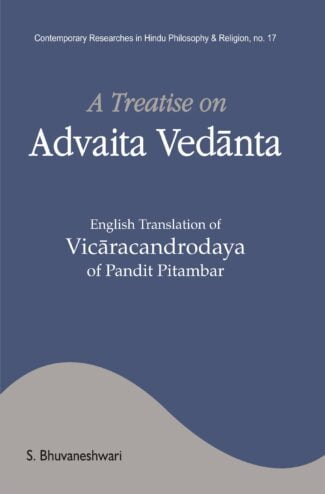
This English version of Vicaracandrodaya elucidates the basic concepts of Advaita Vedanta as a dialogue between a guru and his disciple. A true knowledge seeker who studies this text under a brahmanistha guru will get to know the secrete knowledge of Vedanta. Also, it is a ready reference to the basic concepts in Pancadasi of Vidyaranya and Vicarasagara of Niscaladasa.
A prakarana in old Hindi (one of the regional mixed dialects), Vicaracandrodaya elucidates the basic concepts of Advaita Vedanta in the form of questions and answers. Pandit Pitambar, the author of the text, presents this work as a dialogue between a guru and his disciple. This book is an English translation of Vicaracandrodaya, by S. Bhuvaneshwari. It is spread across 249 questions and their answers, and takes the reader into the essence of the entire Vedantashastra. It also has a Laghu-vedanta-kosha explaining the basic Vedantic terms and a chapter as index providing quick reference to the basic concepts of Advaita Vedanta.
The author enunciates that a true knowledge seeker who studies this text under a brahmanishtha guru will get to know the secrete knowledge of Vedanta. And this knowledge will dispel darkness from his mind as the rising moon dispels darkness from the world. However, he insists that it should be studied from a guru with shraddha as Vedanta cannot be grasped without the guidance of an enlightened teacher. Also, this book serves as a ready reference to the basic concepts as discussed in Pancadashi of Vidyaranya and Vicarasagara of Nishcaladasa.
This volume is both a guide to the beginners in Vedanta and a text for nididhyasana. It will benefit all the people who dwell in the domain of Vedanta.
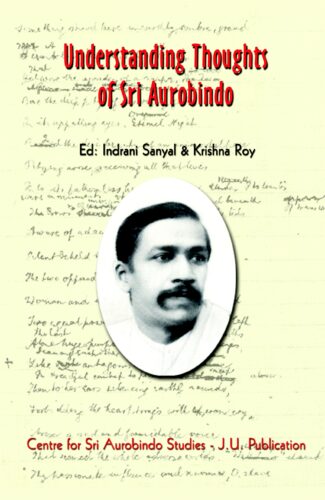
This volume explores various dimensions of thoughts of Sri Aurobindo (1872-1950), respected as a patriot, nationalist, social reformer, educationist, historian, poet, visionary, Yoga and a philosopher. He interprets Indian philosophical and spiritual tradition dating back to the Vedas and the Upanishads and emphasises National Education, in cultural and spiritual sense.
Understanding Thoughts of Sri Aurobindo explores various dimensions of thoughts of Sri Aurobindo (18721950) who is being respected as a patriot, nationalist, social reformer, educationist, historian, poet, visionary, Yogi and philosopher. Sri Aurobindo is the interpreter of the Indian philosophical and spiritual tradition and one of the ablest exponents of this tradition dating back to the Vedas and the Upanishads. Sri Aurobindo’s emphasis on National Education, more in the cultural and spiritual sense, may provide an answer to the intellectual, moral and spiritual crisis. This volume focuses upon the holistic, interdisciplinary approach to the thoughts of Sri Aurobindo, whose views and actions have left a lasting influence on the development of modern India. Referring to his three major works, The Life Divine, The Synthesis of Yoga and Savitri, as well as over thirty other works where he expounded his thoughts, the well-researched writings reveal the special features of his vision. They focus on his integral approach to the concept of evolution, his notion of integral philosophy and his concept of integral Yoga. The essays include an in-depth study of Sri Aurobindo’s concept of man, of state, and views regarding uplift of humanity. This book contains scholarly articles that seek to unravel the many dimensions of his thoughts. Students, researchers and persons interested in Sri Aurobindo Studies will be immensely benefited from this volume.

This work is an attempt to reveal the fundamentals of Carvaka philosophy the materialistic system of thought propounded by the ancient philosophers of India and its epistemological, metaphysical and ethical concerns. The Carvaka system is compared and contrasted with other systems of ancient philosophy.
Carvaka is the materialistic system of thought propounded by the ancient philosophers of India. The Carvaka system of philosophy has been much criticized and even ridiculed since the ancient times as the Carvakas have been dubbed as atheists and hedonists. This work is an attempt to reveal the fundamentals of Carvaka philosophy, and its epistemological, metaphysical and ethical concerns. Beginning with the origin and development of Indian materialism, it addresses the controversial and disputed issues regarding Carvaka philosophy on the basis of a profound study of the original sources on the subject and by referring to modern researches on it. It highlights the contributions of the Carvakas in the furtherance of moral and philosophical thoughts and their uniqueness in many respects, such as the Carvaka School being the only one among ancient Indian philosophical schools to accept only one pramana — perception. The Carvaka system is compared and contrasted with other systems of ancient Indian philosophy for the purpose. The book is praiseworthy in its attempt to present its findings in a logical manner.
The book will interest scholars and students of ancient Indian philosophy as well as general readers who are keen to understand ancient Indian philosophy.
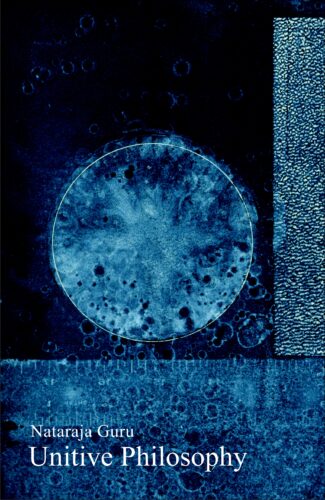
It is a uniquely rewarding book that will open up vast uncharted regions for exploration, especially for the serious thinker unsatisfied by the modern pop philosophy. A meaningful philosophy must have an absolute idea implicit in it and this book investigates several prominent strains of philosophy, to identify the absolute element.
Nataraja Guru single-handedly revolutionized philosophical thought in the mid-twentieth century. At a time when science had unwittingly followed Marxism into a materialist desert, he never relinquished his insight into what had been omitted. Now that scientists and philosophers everywhere are pausing in perplexity, having bumped up against the limits of their partial outlook, the Gurus works offer to reintroduce the wisdom that can bring the desert back to life. Stung by the horrors of the Inquisition, western science turned its back on metaphysics for hundreds of years. The extended effort to include as much as possible of the universe under the aegis of physical reality was an interesting experiment, but it has about played itself out. Ideas, memories, emotions and time, among other major categories, are metaphysical entities that have transcended every effort at being reduced to material existence. Matter itself is seen to be brimming with energy as soon as you look beneath the surface. A counterbalancing backlash has occurred recently in which religious and other metaphysical ideas, no matter how divorced from reality, are being embraced as a welcome escape from uncompromising materialism. For a sensible philosophy free of prejudice, which can open the road to further progress in human thought, a balance must be struck between physics and metaphysics. Each must support and verify the other. Nataraja Guru clearly establishes the basis for such an advance in this work, presenting an overarching scheme to integrate all aspects of reality under one roof. Any meaningful philosophy must have some version of an absolute idea or value implicit in it. After presenting his own absolute system Nataraja Guru investigates several prominent strains of philosophy, including the rationalist and the materialist, to identify the absolute element hidden within each of them. Totalitarianism and absolutism are shown to be totally antithetical, the former being highly exclusionary while the latter embraces every possibility. Dialectic thinking is at the heart of the Gurus philosophy, leading to an absolute vision that incorporates all parts within the whole. For the serious thinker unsatisfied by modern pop philosophy, Unitive Philosophy is a uniquely rewarding book that will open up vast uncharted regions for exploration.

The book presents the notion of unity in diversity in the context of globalization and multiculturalism. The concepts of unity and diversity have been contested in classical and modern theories. These theories give rise to the concept of diversity but jointly somehow they emerge as unity in diversity.
The book presents the notion of unity in diversity in the context of globalization and multiculturalism. Philosophically speaking, the concepts of unity and diversity have been contested in classical and modern theories; for instance, Plato’s idea of harmony and goodness, Aristotle’s phronesis or practical wisdom (teleology), Kant’s categorical imperative (deontology), and Mill’s utilitarianism (consequentialism) on the one hand and purusarthas divided into abhyudaya and nihsreyas, etc. on the other. These theories give rise to the concept of diversity but jointly somehow they emerge as unity in diversity.
In the era of globalization and multiculturalism, teleology, deontology, consequentialism and so on have been described, critiqued and even appreciated and appropriated from pluralistic perspective. With globalization and multiculturalism, human life is affected not only insofar as market is concerned, but also the ethnical, cultural and linguistic identities are equally affected. However, unlike globalization, multiculturalism endorses the role of the State in protecting and safeguarding the rights of diverse cultural groups, values and practices, marriage and settlements, property and inheritance, etc. so that members of each cultural community should become the valid participants in the civil and democratic life in the globalized world.
The perspectives of, and the conflict between individual needs and rights, and group needs and rights, have been conceptualized under liberalism and communitarianism. It is proposed to be achieved by developing cultural transformations in the era of globalization, thus creating reasonable exclusion on broader values. The effort is to allow these values to inform and reinforce each other for the possible foundations of multiculturalism, specially cosmopolitanism in the globalized world.